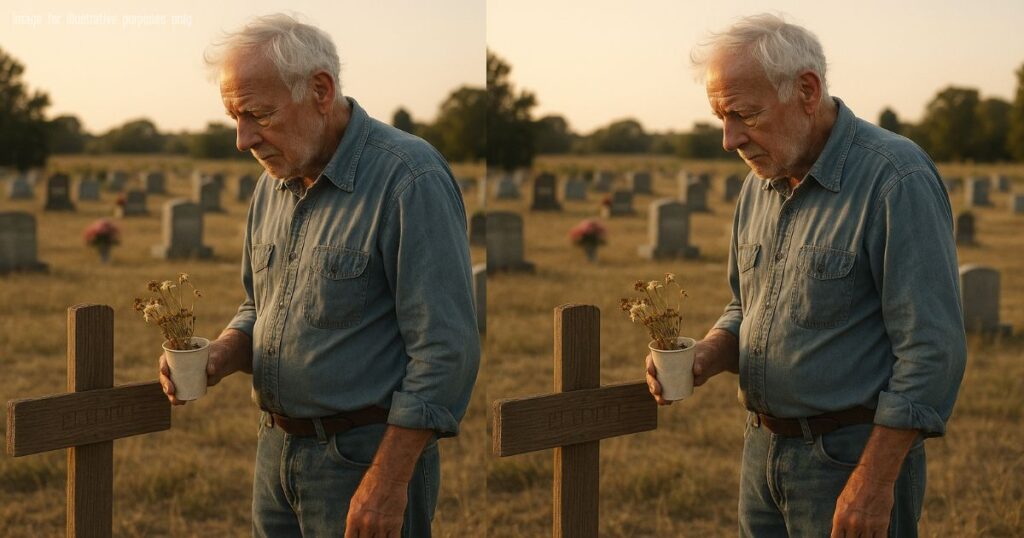The money dried up faster than I thought. Pensions don’t stretch like they used to. And folks assume if you work with your hands your whole life, you must’ve done something wrong. That you deserve the ache in your joints, the empty fridge, the unpaid electric bill.
I started selling off tools.
The edger first. Then the power trimmer. Gas mower last. I held onto my spade — the short-handled one, old as hell but still sharp as memory.
It was spring again. I hadn’t touched a flowerbed in months.
But then, one morning, I woke to a sound I hadn’t heard in years.
Knocking.
Not the digital kind. Not the “tap to ring” nonsense.
A real knock.
Three firm raps on wood.
I opened the door.
She was maybe in her early thirties. Brown hair in a braid, freckles, overalls with a stain on the pocket. Behind her stood a boy, maybe ten. He was holding something in a Tupperware container.
“Are you Eli Thomas?” she asked.
I nodded.
“I think you knew my grandmother.”
“Who’s your grandma?”
“Mary.”
The name hit me like a shovel to the chest.
“My Mary?”
She nodded. “Mary Jenkins. She used to work at Murphy’s Diner. You were her husband.”
“I am her husband.”
The woman smiled softly. “She used to tell me stories when I was little. Said you had the best hands of any man she ever knew.”
I didn’t know what to say.
She looked over my shoulder at the inside of the house — small, cluttered, a little dim.
“I bought the old Jenkins place out by the ridge,” she said. “Thought I’d try growing something out there. It’s all weeds now. But I found some old tools. Yours, I think. She kept them in a crate.”
I swallowed hard.
The boy stepped forward. “We brought you a peach pie. Mama said you like cobbler, but she doesn’t know how to make it.”
I took the Tupperware with shaking hands.
“I’d like to hire you,” the woman said. “Not because I need a gardener. But because that land was once full of love. And I think you’re the only one who knows how to find it again.”
—
We started the next week.
The house still had the same porch. Paint was peeling now, but the bones were good. I remembered hammering in those floorboards with my brother-in-law in the summer of ’79, sweating through our shirts, laughing about something Mary had said.
We walked through the yard together. She showed me what she wanted — wildflowers, mostly. Nothing manicured. Nothing fake.
The boy followed us everywhere. Asked questions like kids do.
“What’s that tool called?”
“Why are worms good?”
“Did you really love my great-grandma?”
I answered every one.
We worked together for three weeks.
Digging, clearing, turning soil. I hadn’t felt that kind of ache in years — the good kind. The kind that says you did something honest.
One evening, while I was trimming back a stubborn patch of crabgrass, the boy came running from behind the old shed.
“Mr. Eli! You gotta come see this!”
I hobbled after him.
Behind the shed was a mound of overgrowth — dead vines, broken fence post, thick thistle. He pointed at the base.
“There’s something here. Looks like wood.”
We got down on our knees. Started pulling.
Beneath the mess was a rotted bench. One I’d built for Mary the year after we lost the baby. She used to sit there in the evenings, sipping tea, watching fireflies.
I ran my hand over the worn plank.
There was something carved into it.
A heart.
Inside it: M + E.
The boy was quiet.
Then he asked, “Is that you and her?”
I nodded.
He smiled. “It’s still here.”
I looked at him.
So was I.
—
That night, I stayed late. They brought me dinner — grilled cheese, tomato soup, and a slice of pie with canned whipped cream.
We sat on the porch and watched the sun dip below the ridge.
For the first time in years, I didn’t feel forgotten.
I felt like someone had opened the window and let the air back in.
Someone remembered us.
Remembered her.
And remembered me.


